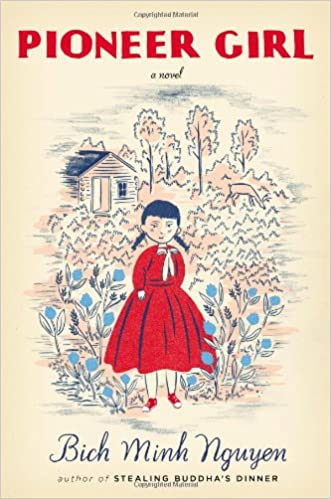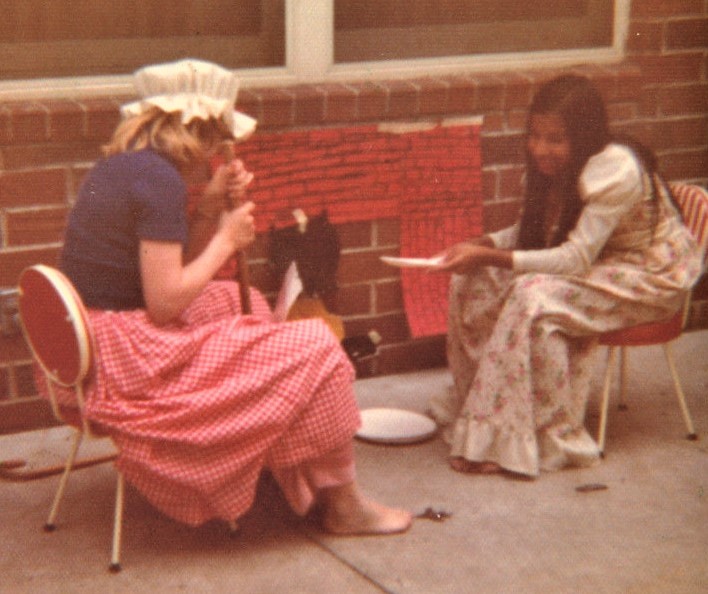
I’m so glad to finally discover the author Bich Minh Nguyen. I believe her name is pronounced Bik Min Ngwen. A refugee from Vietnam, she grew up in Michigan. I was interested to read her novel Pioneer Girl because, like the main character Lee Lien, I was also obsessed with the Little House books written by Laura Ingalls Wilder and her daughter Rose Wilder Lane.
Lee, home after earning a PhD in American literature but failing to land a job, discovers a brooch that a journalist named Rose left at her grandfather’s Saigon café during the Vietnam war. The brooch looks remarkably like a brooch that Laura Ingalls Wilder owned and described in one of her books. Lee wonders—could this brooch have belonged to the real Rose Wilder Lane, who was indeed a journalist in Saigon during the Vietnam War? Lee sets off on a wild goose chase to figure out the answer, and also to escape the critical eye of her mother.
I got the sense that one reason for Lee’s obsession with Laura and Rose is to find a connection between her murky past (she knows very little about her ancestors’ lives in Vietnam) and a quintessential American figure. Lee asks herself, “How many times during the years of my Little House obsession had I pretended the pin was Laura’s secret gift to me?” (p. 46). Later in the book she admits that she was “searching for, maybe hoping for, my own claim on America’s favorite pioneer family” (p. 81).
Interestingly, at the time I was reading this novel, I came across some photos of myself at the age of eleven, dressed in a long, frilly “pioneer” type dress that my mother had made for me. I loved that dress. In fact, the dress was the basis of a skit that I wrote and that my best friend and I performed on her back patio for Mother’s Day. We rounded up as many neighborhood mothers as we could to watch the skit. I don’t remember how many actually showed up, but my mother must have been there to take the photos. The skit involved two pioneer girls who were grumpy about all the housework they had to do, and decided to run away.

I saw nothing unusual in the fact that I was an Indian American girl pretending to be a pioneer American settler. At that time, I didn’t really know what to make of my Indian heritage. I didn’t even know the phrase “Indian American,” and I’d never read anything about Indian Americans. Pretending I was a pioneer girl was like borrowing someone else’s heritage for my own. I think I longed for the close multi-generational family of the Little House in the Big Woods book, a family in which parents, children, and community share the same culture, values, and expectations. I didn’t realize until I was an adult that the idyllic childhood portrayed in those books was a fiction. Laura’s real life was much harder and more tragic than the books reveal. In addition, as a child I only vaguely picked up on the racism that made it acceptable for a white family to displace indigenous American Indian families.
The “pioneer girl” in Nguyen’s title could refer to Laura, to Rose (who was a pioneering woman journalist), or to the main character Lee, the first in her family to earn an American PhD. The novel is written in the first person and the style is so natural that one might mistake it for memoir. The characters of Lee, her older brother Sam, her mother, and her grandfather come across as unique, real people. The dialogue flows effortlessly, and interesting bits of backstory are woven in seamlessly. I was kept engaged by the several mysteries that Lee tries to untangle over the course of the novel.
I’m looking forward to reading more by Bich Minh Nguyen. She is also the author of the memoir Stealing Buddha’s Dinner and the novel Short Girls.


[…] For the rest of this article, please see my Second Generation Stories website. […]